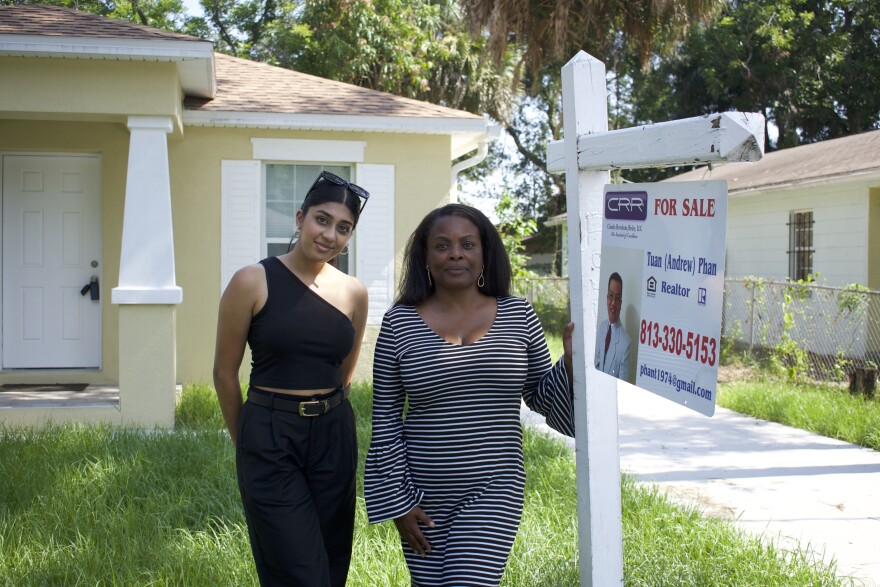Investor purchases of homes in the greater Tampa Bay region declined 13% since last summer, according to new data released by real estate brokerage Redfin.
Taylor Marr, chief deputy economist at Redfin, said this could be an indicator that the housing market is stabilizing.
“So the entire housing market is cooling down. It's reacting, sort of backing off the high levels of demand that we had throughout the pandemic,” Marr said.
Tampa is among the top 10 U.S. cities by market share that saw a dip in investor purchases during the first quarter.
Records on housing sales and purchases from 40 counties across the country were part of Redfin’s data analysis. Investors were defined as buyers with the keywords "LLC," "Inc.," "Trust," "Corp" or "Homes" in its name, according to the report.
In Tampa, investors bought 4,214 homes between January and March. That’s down from a record number of 5,065 homes last summer but still above pre-pandemic levels.
Even so, investors have been able to hold onto a 25% market share, or the proportion of total value in a certain market. This means even while buying less homes, investors have maintained the same amount of value in Tampa’s housing market.
Marr said the pullback on investor purchases in the housing market can be explained by the jump in mortgage interest rates, impacting demand, and higher borrowing costs.
“As a result, buyers are just priced out of the market and we’re seeing demand pull back,” he said. “And investors are not immune.”
Marr said it could be good news for individual homebuyers if there’s less investor competition in Tampa’s housing market.
“They behave differently than your typical mom-and-pop landlord,” he said.
The prevalence of investors can add upward pressure to the housing and renting markets: driving up home prices, the cost of rent and the rate of evictions. It’s also common for first-time homebuyers to get outbid by cash-based offers in an investor-heavy market.
Lei Wedge, an associate professor at USF’s Muma College of Business, said that in the last year 25% of all homes sold in Tampa were paid for in cash. She said that’s a large jump when compared to another peak year in the housing market, in 2006, when 8% of Tampa homes were bought in cash.
Less investor competition may be good news for homebuyers. But Wedge said there are other factors that make it hard to be a buyer in Tampa’s housing market.
“Yeah, you have less investors. You have fewer people buying. But the problem is…it’s going to be a lot more expensive for your mortgage,” she said.
Wedge explained that it will be easier for individual buyers to find a home. But it may be harder for them to afford it.
This is especially true considering the influx of people to the greater Tampa Bay region who are willing to pay higher rent and mortgages. Wedge predicts the market will ultimately end up catering to this population.
“I think what will happen is — eventually — the city’s going to squeeze the lower-income people out of the city,” she said.

CEO Antoinette Hayes-Triplett said that’s why the Tampa Hillsborough Housing Initiative is working to create innovative housing solutions for the community.
As part of its strategic plan, which was funded $4.7 million by Hillsborough County, THHI launched a shared housing initiative.
“The market has changed the way that we have to do business,” Hayes-Triplett said. “And we’re trying to be as flexible as possible and as creative as possible to make sure that people have housing.”
The shared housing initiative plans to provide 50 three- and four-bedroom homes in the Tampa community at a subsidized rent for people emerging from homelessness.
Last year, THHI purchased and repurposed two homes. Next week, it plans to close on two more homes on Chelsea Street in East Tampa. This comes after point-in-time data published earlier this month show a 4% jump in homelessness in Hillsborough County.
Hayes-Triplett said the initiative would like to amp up efforts, but the biggest roadblock is closing on contracts amid inflated home prices and investor competition in the market.
“Right now, it takes us 60 days to close. By that time, we’ve lost out to investors that are paying: in cash, site unseen, no appraisal, no inspections,” she said. “That’s the market that we’re dealing with.”
Gabriella Paul covers the stories of people living paycheck to paycheck in the greater Tampa Bay region for WUSF. She's also a Report for America corps member. Here’s how you can share your story with her.





